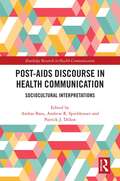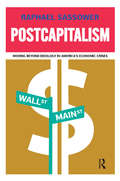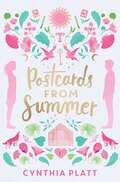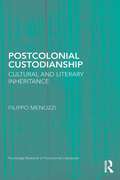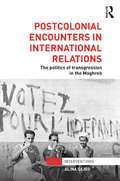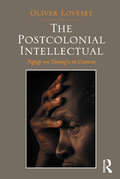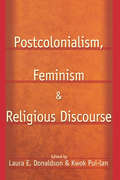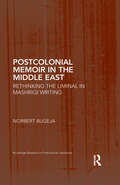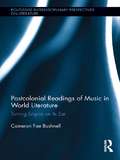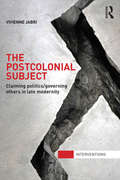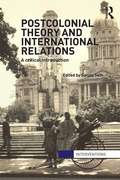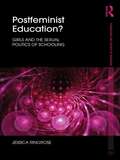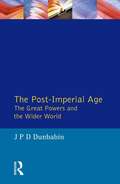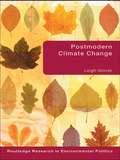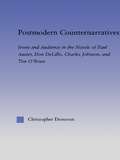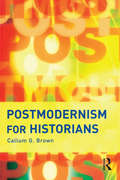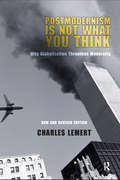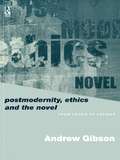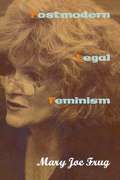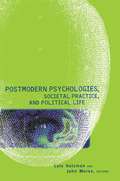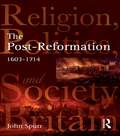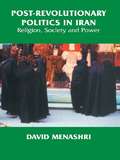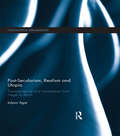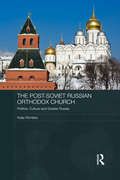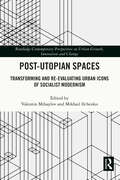Special Collections
Benetech’s Global Certified Accessible Titles
Description: Benetech’s GCA program is the first independent third-party EPUB certification to verify ebook accessibility. By creating content that is born accessible, publishers can meet the needs of all readers. Learn more: https://bornaccessible.benetech.org/
- Table View
- List View
Post-AIDS Discourse in Health Communication
by Ambar BasuThis book examines the discourse of a "post-AIDS" culture, and the medical-discursive shift from crisis and death to survival and living. Contributions from a diverse group of international scholars interrogate and engage with the cultural, social, political, scientific, historical, global, and local consumptions of the term "post-AIDS" from the perspective of meaning-making on health, illness, and well-being. The chapters critique and connect meanings of "post-AIDS" to topics such as neoliberalism; race, gender, and advocacy; disclosure; relationships and intimacy; stigma and structural violence; family and community; migration; work; survival; normativity; NGOs, transnational organizations; aging and end-of-life care; the politics of ART and PrEP; mental illness; campaigns; social media; and religion. Using a range of methodological tools, the scholarship herein asks how "post-AIDS" or the "End of the Epidemic" is communicated and made sense of in everyday discourse, what current meanings are circulated and consumed on and around HIV and AIDS, and provides thorough commentary and critique of a "post-AIDS" time. This book will be an essential read for scholars and students of health communication, sociology of health and illness, medical humanities, political science, and medical anthropology, as well as for policy makers and activists.
Postcapitalism
by Raphael SassowerDebates over the role of government have intensified in the wake of America's deepest financial crisis since the Depression. This book suggests new ways of moving forward based on the policies and principles that have worked in the past. Sassower shows how American pragmatism has guided the more successful financial policies undertaken during the past century. This means that from the workplace to foreign aid, Americans benefit when they collaborate with each other rather than only pursue their self-interest in competitive ways. Drawing on thinkers from Adam Smith to Keynes to Bernanke, Sassower shows how a new era of postideological capitalism can emerge in the wake of the current economic crisis-renewing America's leadership for the future.
Postcards from Summer
by Cynthia PlattThe Notebook meets Love & Gelato in this heart-wrenching novel about a teen girl who travels to her late mother&’s majestic summertime home to learn of the romance—and the tragedy—that changed her life forever.Seventeen-year-old Lexi has always wanted to know more about the mother who passed away when she was only a child. But her dad will barely talk about her. He says he&’d rather live in the present with Lexi, her stepmom, and her half-brother. Lexi loves her family, too, but is it so wrong to want to learn about the mom she never got to know? When Lexi&’s grandma dies and secretly leaves her a worn blue chest that belonged to Lexi&’s mother, Lexi is ecstatic to find a treasure trove of keepsakes. Her mom held onto letters, pamphlets, flyers, and news articles all from the same beautiful summertime getaway: Mackinac Island—plus a cryptic postcard that hints at a forbidden romance. If Lexi wants answers, this island is where she needs to go. Without telling her dad, Lexi goes to the gorgeous Mackinac Island in Lake Huron, reachable only by ferry. Cars are forbidden and bikes are the number one mode of transportation along the quaint cobblestone streets, and the magical hotel that rests alongside cozy cafés and bookshops. While following her mother&’s footsteps, Lexi befriends an elderly former Broadway star and a charming young hotel worker while quickly falling in love with her surroundings. But though the island may be beautiful, it&’s hiding unfortunate secrets—some with her mother at the center. Could some questions be best left buried beneath the blue waters?
Postcolonial Custodianship
by Filippo MenozziThis book engages with current developments in postcolonial research, exploring notions of cultural transmission, tradition and modernity, authenticity, cross-cultural aesthetics and postcolonial ethics. The author considers the ethical responsibility of the postcolonial intellectual, enhancing our understanding of this topic through the concept of custodianship, which may be defined as a responsibility towards the other in forms of cultural and literary inheritance. The author introduces custodianship as a central theme and a vital question for the committed intellectual today, proposing original interpretations of major postcolonial texts by key figures including Anita Desai, Gayatri Chakravorty Spivak, Mahasweta Devi and Arundhati Roy. Through close reading and historical analysis, Postcolonial Custodianship reveals that a practice of custodianship has always been an essential element of these writers’ ethical engagement, yet in a way that has never been explored. The author contends that the question of custodianship should not be seen as a merely negative designation; it is by redefining the very meaning of custodianship that the ethical dimension of postcolonialism can be rediscovered.
Postcolonial Encounters in International Relations
by Alina SajedPostcolonial Encounters in International Relations examines the social and cultural aspects of the political violence that underpinned the French colonial project in the Maghreb, and the multi-layered postcolonial realities that ensued. This book explores the reality of the lives of North African migrants in postcolonial France, with a particular focus on their access to political entitlements such as citizenship and rights. This reality is complicated even further by complex practices of memory undertaken by Franco-Maghrebian intellectuals, who negotiate, in their writings, between the violent memory of the French colonial project in the Maghreb, and the contemporary conundrums of postcolonial migration. The book pursues thus the politics of (post)colonial memory by tracing its representations in literary, political, and visual narratives belonging to various Franco-Maghrebian intellectuals, who see themselves as living and writing between France and the Maghreb. By adopting a postcolonial perspective, a perspective quite marginal in International Relations, the book investigates a different international relations, which emerges via narratives of migration. A postcolonial standpoint is instrumental in understanding the relations between class, gender, and race, which interrogate and reflect more generally on the shared (post)colonial violence between North Africa and France, and on the politics of mediating violence through complex practices of memory.
The Postcolonial Intellectual
by Oliver LoveseyAddressing a neglected dimension in postcolonial scholarship, Oliver Lovesey examines the figure of the postcolonial intellectual as repeatedly evoked by the fabled troika of Said, Spivak, and Bhabha and by members of the pan-African diaspora such as Cabral, Fanon, and James. Lovesey’s primary focus is NgÅ©gÄ© wa Thiong’o, one of the greatest writers of post-independence Africa. NgÅ©gÄ© continues to be a vibrant cultural agitator and innovator who, in contrast to many other public intellectuals, has participated directly in grassroots cultural renewal, enduring imprisonment and exile as a consequence of his engagement in political action. Lovesey’s comprehensive study concentrates on NgÅ©gÄ©’s non-fictional prose writings, including his largely overlooked early journalism and his most recent autobiographical and theoretical work. He offers a postcolonial critique that acknowledges NgÅ©gÄ©’s complex position as a virtual spokesperson for the oppressed and global conscience who now speaks from a location of privilege. NgÅ©gÄ©’s writings, Lovesey shows, display a seemingly paradoxical consistency in their concerns over nearly five decades at the same time that there have been enormous transformations in his ideology and a shift in his focus from Africa’s holocaust to Africa’s renaissance. Lovesey argues that NgÅ©gÄ©’s view of the intellectual has shifted from an alienated, nearly neocolonial stance to a position that allows him to celebrate intellectual activism and a return to the model of the oral vernacular intellectual even as he challenges other global intellectuals. Tracing the development of this notion of the postcolonial intellectual, Lovesey argues for NgÅ©gÄ©’s rightful position as a major postcolonial theorist who helped establish postcolonial studies.
Postcolonialism, Feminism and Religious Discourse
by Kwok Pui-Lan and Laura E. DonaldsonContributors examine white feminist theology's misappropriations of Native North American women, Chinese footbinding, and veiling by Muslim women, as well as the Jewish emancipation in France, the symbolic dismemberment of black women by rap and sermons, and the potential to rewrite and reclaim canonical stories.
Postcolonial Memoir in the Middle East
by Norbert BugejaThis book reconsiders the notion of liminality in postcolonial critical discourse today. By visiting Mashriqi writers of memoir, Bugeja offers a unique intervention in the understanding of 'in-between' and ‘threshold’ states in present-day postcolonialist thought. His analysis situates liminal space as a fraught form of consciousness that mediates between conditions of historical contingency and the memorializing present. Within the present Mashriqi memoir form, liminal spaces may be read as articulations of 'representational spaces' — narrative spaces that, based as they are within the histories of local communities, are nonetheless redolent with memorial and imaginary elements. Liminal consciousness today, Bugeja argues, is a direct consequence of the impact of volatile present-day memories on the re-conception of the open wounds of history. Incisive readings of life-writings by Mourid Barghouti, Amin Maalouf, Orhan Pamuk, Amos Oz, and Wadad Makdisi Cortas demonstrate the double-edged representational chasm that opens up when present acts of memorializing are brought to bear upon the elusive histories of the early-twentieth-century Mashriq. Sifting through the wide-ranging theoretical literature on liminality and challenging received views of the concept, this book proposes a nuanced, materialist, and original rethinking of the liminal as a more vigilant outlook onto the political, literary and historical predicaments of the contemporary Middle East.
Postcolonial Readings of Music in World Literature
by Cameron Fae BushnellThis book reads representations of Western music in literary texts to reveal the ways in which artifacts of imperial culture function within contemporary world literature. Bushnell argues that Western music’s conventions for performance, composition, and listening, established during the colonial period, persist in postcolonial thought and practice. Music from the Baroque, Classical, and Romantic periods (Bach through Brahms) coincides with the rise of colonialism, and Western music contains imperial attitudes and values embedded within its conventions, standards, and rules. The book focuses on the culture of classical music as reflected in the worlds of characters and texts and contends that its effects outlast the historical significance of the real composers, pieces, styles, and forms. Through examples by authors such as McEwan, Vikram Seth, Bernard MacLaverty, Chang-rae Lee, and J.M. Coetzee, the book demonstrates how Western music enters narrative as both acts of history and as structures of analogy that suggest subject positions, human relations, and political activity that, in turn, describes a postcolonial condition. The uses to which Western music is put in each literary text reveals how European art music of the seventeenth through the nineteenth centuries is read and misread by postcolonial generations, exposing mostly hidden cultural structures that influence our contemporary understandings of social relations and hierarchies, norms for resolution and for assigning significance, and standards of propriety. The book presents strategies for thinking anew about the persistence of cultural imperialism, reading Western music simultaneously as representative of imperial, cultural dominance and as suggestive of resistant structures, forms, and practices that challenge the imperial hegemony.
The Postcolonial Subject
by Vivienne JabriThis book places the lens on postcolonial agency and resistance in a social and geopolitical context that has witnessed great transformations in international politics. What does postcolonial politics mean in a late modern context of interventions that seek to govern postcolonial populations? Drawing on historic and contemporary articulations of agency and resistance and highlighting voices from the postcolonial world, the book explores the transition from colonial modernity to the late modern postcolonial era. It shows that at each moment wherein the claim to politics is made, the postcolonial subject comes face to face with global operations of power that seek to control and govern. As seen in the Middle East and elsewhere, these operations have variously drawn on war, policing, as well as pedagogical practices geared at governing the political aspirations of target societies. The book provides a conceptualisation of postcolonial political subjectivity, discusses moments of its emergence, and exposes the security agendas that seek to govern it. Engaging with political thought, from Hannah Arendt, to Frantz Fanon, Michel Foucault, and Edward Said, among other critical and postcolonial theorists, and drawing on art, literature, and film from the postcolonial world, this work will be of great interest to students and scholars of critical international relations, postcolonial theory, and political theory.
Postcolonial Theory and International Relations
by Sanjay SethWhat can postcolonialism tell us about international relations? What can international relations tell us about postcolonialism? In recent years, postcolonial perspectives and insights have challenged our conventional understanding of international politics. Postcolonial Theory and International Relations is the first book to provide a comprehensive and accessible survey of how postcolonialism radically alters our understanding of international relations. Each chapter is written by a leading international scholar and looks at the core components of international relations – theories, the nation, geopolitics, international law, war, international political economy, sovereignty, religion, nationalism, Empire etc. – through a postcolonial lens. In so doing it provides students with a valuable insight into the challenges that postcolonialism poses to our understanding of global politics.
Postfeminist Education?
by Jessica RingroseThis book challenges a contemporary postfeminist sensibility grounded not only in assumptions that gender and sexual equality has been achieved in many Western contexts, but that feminism has gone ‘too far’ with women and girls now overtaking men and boys - positioned as the new victims of gender transformations. The book is the first to outline and critique how educational discourses have directly fed into postfeminist anxieties, exploring three postfeminist panics over girls and girlhood that circulate widely in the international media and popular culture. First it explores how a masculinity crisis over failing boys in school has spawned a backlash discourse about overly successful girls; second it looks at how widespread anxieties over girls becoming excessively mean and/or violent have positioned female aggression as pathological; third it examines how incessant concerns over controlling risky female sexuality underpin recent sexualisation of girls' moral panics. The book outlines how these postfeminist panics over girlhood have influenced educational policies and practices in areas such as academic achievement, anti-bullying strategies and sex-education curriculum, making visible the new postfeminist, sexual politics of schooling. Moving beyond media or policy critique, however, this book offers new theoretical and methodological tools for researching postfeminism, girlhood and education. It engages with current theoretical debates over possibilities for girls’ agency and empowerment in postfeminist, neo-liberal contexts of sexual regulation. It also elaborates new psychosocial and feminist Deleuzian methodological approaches for mapping subjectivity, affectivity and social change. Drawing on two UK empirical research projects exploring teen-aged girls’ own perspectives and responses to postfeminist panics, the book shows how real girls are actually negotiating notions of girls as overly successful, mean, violent, aggressive and sexual. The data offers rich insight into girls’ gendered, raced and classed experiences at school and beyond, exploring teen peer cultures, friendship, offline and online sexual identities, and bullying and cyberbullying. The analysis illuminates how and when girls take up and identify with postfeminist trends, but also at times attempt to re-work, challenge and critique the contradictory discourses of girlhood and femininity. In this sense the book offers an opportunity for girls to ‘talk back’ to the often simplistic either wildly celebratory or crisis-based sensationalism of postfeminist panics over girlhood. This book will be essential reading for those interested in feminism, girlhood, media studies, gender and education.
The Post-Imperial Age
by J.P.D. DunbabinThis volume looks at the impact on the wider world of the end of the European empires and their replacement by a new international order dominated by East-West rivalries. After surveying the decolonization process, the book looks successively at the different patterns of experience in Southern Africa, South East Asia and India, East Asia and the Pacific, the Middle East, and the Americas. It concludes with a sustained analysis of the International System -- the functioning of international organizations and the global role of money and trade.
Postmodern Climate Change
by Leigh GloverA much-needed analysis of international climate change politics as a key issue of modernity and in the context of environmentalism. Leigh Glover presents a new way to understand the climate change problem and is concerned with problems of modernity and postmodernity in the context of contemporary environmental thought. Focusing on the international politics surrounding the UN agreement of climate change, the Framework Convention on Climate Change and its Kyoto Protocol, Glover examines the issue using the key aspects of climate change science, global environmental politics, and global environmental management.
Postmodern Counternarratives
by Christopher DonovanThis book provides a wide-ranging discussion of realism, postmodernism, literary theory and popular fiction before focusing on the careers of four prominent novelists. Despite wildly contrasting ambitions and agendas, all four grow progressively more sympathetic to the expectations of a mainstream literary audience, noting the increasingly neglected yet archetypal need for strong explanatory narrative even while remaining wary of its limitations, presumptions, and potential abuses. Exploring novels that manage to bridge the gap between accessible storytelling and literary theory, this book shows how contemporary authors reconcile values of posmodern literary experimentation and traditional realism.
Postmodernism for Historians
by Callum G. BrownPostmodernism is an essential approach to History. This is the first dedicated primer on postmodernism for the historian. It offers a step-by-step guide to postmodern theory, includes a guide to how historians have applied the theory, and provides a review of why its critics are wrong. In simple and clear language, it takes the reader through the chain of theory that developed in the 20th century to become now, in the early 21st century, the leading stimulant of new forms of research in History.With separate chapters on The Sign, The Discourse, Post/Structuralism, The Text, The Self, and Morality, this book will encourage a new critical awareness of Theory when reading books of History, and when writing essays and dissertations. Armed with the principal ideas of Saussure, Barthes, Foucault, and Derrida, the historians can formulate how to combine empirical History with the excitement of fresh perspectives and new skills, merged in the new moral impetus of the postmodern condition. Designed for the beginner this is the essential postmodern starting point.
Postmodernism is Not What You Think
by Charles C. Lemert'Charles Lemert is one of the most thoughtful and interesting of sociology's postmodernists. He recurrently finds new angles of vision and is especially helpful for overcoming the pernicious opposition of 'micro' and 'macro' perspectives.' -Craig Calhoun, New York University (on the first edition) Highly readable, the second edition of Postmodernism Is Not What You Think responds to the widespread claim that postmodernism is over. It explains the historical connections between the postmodern and globalization. Those who wish to kill the term postmodernism still must face the facts that the former nationalistic world-system has collapsed and is slowly being replaced by a more global set of structures. The book is completely revised and updated with an entirely new section on globalization. The media and popular culture, identity politics, the science wars, politics and cultural studies, structuralism and poststructuralism, and the new sociologies are also put in perspective as signs of the new social formations dawning at the end of the modern age. Lemert shows that the postmodern is less a theory than a condition of social life brought about by the trouble modernity has gotten itself into.
Postmodernity, Ethics and the Novel
by Andrew GibsonIn Postmodernity, Ethics and the Novel Andrew Gibson sets out to demonstrate that postmodern theory has actually made possible an ethical discourse around fiction. Each chapter elaborates and discusses a particular aspect of Levinas' thought and raises questions for that thought and its bearing on the novel. It also contains detailed analyses of particular texts. Part of the book's originality is its concentration on a range of modernist and postmodern novels which have seldom if ever served as the basis for a larger ethical theory of fiction. Postmodernity, Ethics and the Novel discusses among others the writings of Joseph Conrad, Henry James, Jane Austen, Samuel Beckett, Marcel Proust and Salman Rushdie.
Postmodern Legal Feminism
by Mary Joe FrugA collection of eight essays by Mary Joe Frug, published posthumously. First Published in 1993. Routledge is an imprint of Taylor & Francis, an informa company.
Postmodern Psychologies, Societal Practice, and Political Life
by Lois Holzman and John MorssFirst published in 2000. Routledge is an imprint of Taylor & Francis, an informa company.
The Post-Reformation
by John SpurrThe 17th century was a dynamic period characterized by huge political and social changes, including the Civil War, the execution of Charles I, the Commonwealth and the Restoration. The Britain of 1714 was recognizably more modern than it was in 1603. At the heart of these changes was religion and the search for an acceptable religious settlement, which stimulated the Pilgrim Fathers to leave to settle America, the Popish plot and the Glorious Revolution in which James II was kicked off the throne. This book looks at both the private aspects of human beliefs and practices and also institutional religion, investigating the growing competition between rival versions of Christianity and the growing expectation that individuals should be allowed to worship as they saw fit.
Post-Revolutionary Politics in Iran
by David MenashriAfter the Islamic revolution in Iran, revolutionary leaders had to compromise their ideology. The Iranian ship of state continues to drift in search of an equilibrium between revolutionary convictions and the demands of governance, between religion and state, and Islam and the West.
Post-Secularism, Realism and Utopia
by Jolyon AgarThis book explores the contribution to recent developments in post-secularism, philosophical realism and utopianism made by key thinkers in the Hegelian tradition. It challenges dominant assumptions about what the relationship between religion and our so-called "secular age" should be that have sought to reduce or even eliminate religiosity from the public sphere. It draws upon utopian thinkers within the Hegelian tradition whose work has challenged this narrow secularism. In particular it explores the importance of philosophical transcendence to Hegelian and post-Hegelian religious, social and political theorising. This includes philosophers whose thinking is sympathetic or at least compatible with transcendence (such as Hegel, Taylor, Bhaskar and Bloch) but also those who have a reputation for rejecting transcendence and instead embracing immanence and even atheism (Feuerbach, Marx and Engels). By drawing on the utopian content of these thinkers it seeks to shed new light on the importance religious ideas have played in a range of philosophical positions within the broadly Hegelian tradition from theism, idealism, materialism and atheism to new ideas, especially new research on Hegel's so-called "panentheism". The book will be of interest to those working in the areas of post-secularism and utopian studies. It should also be of interest to academics and students of the recent turn within Critical Realism to "meta-reality" and its implications for Hegelianism and Marxism.
The Post-Soviet Russian Orthodox Church
by Katja RichtersIn recent years, the Russian Orthodox Church has become a more prominent part of post-Soviet Russia. A number of assumptions exist regarding the Church’s relationship with the Russian state: that the Church has always been dominated by Russia’s secular elites; that the clerics have not sufficiently fought this domination and occasionally failed to act in the Church’s best interest; and that the Church was turned into a Soviet institution during the twentieth century. This book challenges these assumptions. It demonstrates that church-state relations in post-communist Russia can be seen in a much more differentiated way, and that the church is not subservient, very much having its own agenda. Yet at the same time it is sharing the state’s, and Russian society’s nationalist vision. The book analyses the Russian Orthodox Church’s political culture, focusing on the Putin and Medvedev eras from 2000. It examines the upper echelons of the Moscow Patriarchate in relation to the governing elite and to Russian public opinion, explores the role of the church in the formation of state religious policy, and the church’s role within the Russian military. It discusses how the Moscow Patriarchate is asserting itself in former Soviet republics outside Russia, especially in Estonia, Ukraine and Belarus. It concludes by re-emphasising that, although the church often mirrors the Kremlin’s political preferences, it most definitely acts independently.
Post-Utopian Spaces
by Valentin Mihaylov and Mikhail IlchenkoFeaturing up-to-date and insightful analyses and comparative case studies from a plethora of countries, this timely book explores ‘ideal’ socialist cities and their transformation under new socio-economic and political conditions after the fall of communism. With contributions from leading scholars in the field, this book prioritises objective scientific knowledge and presents expert rethinking of the historical experience of urban planning in the former socialist countries of Eurasia. It draws on carefully selected examples of iconic cities of socialist modernism, from the post-Soviet space, Central Europe, and the Balkans. The book explores the ongoing transformation of these cities: from uniformed urban environment to chaotic post-modernist planning, from industrialisation to touristification, from deideologisation to making new and still highly contested heritage. Written in an accessible and engaging style, this book will be of interest to students and scholars in urban studies, human geography, sociology, social anthropology, spatial planning, and architectural practice.
